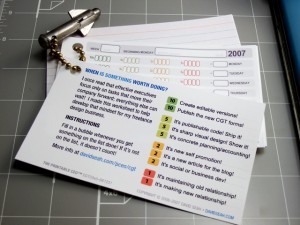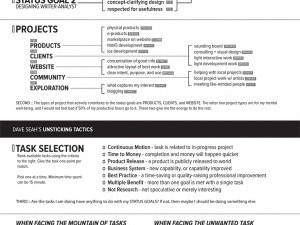(last edited on April 28, 2022 at 3:26 pm)
SUMMARY: Life Balance? It’s more about how you ask the question, isn’t it. This post kicks-off a series on designing a life-balance application for the iPhone, seeking input from people who are asking themselves the same question.
I’ve been working with Al Briggs, an iPhone app developer in Germany, to design a commercial version of ye olde Day Grid Balancer. Al had approached me a few months ago, apparently resonating with the angsty combination of resolve and frustration that the DGB’s Satisfying Things I Want To Do This Week Dammit call to action trumpeted. Our first pass at the application, however, didn’t work for either of us (or his wife, who serves as our “it this really making sense” filter :), and we came to the conclusion that it’s because we didn’t really ask the question in the first place: Well, what is life balance? So we took a giant step back to the beginning of the process and really asked the question.
Investigating Wishes
In hindsight, we did what a lot of people do: did the first thing that came to mind to make direct progress against the goal. When this is manifested in technical design, you end up with a bunch of form windows and buttons. We made some interesting screen designs, but our original approach was essentially “if we capture the data, the purpose can be refined into clarity”. We had the idea that if we just counted hours, we could create an interactive hour counting mechanism from which meaningful reports could be generated. In this way, perhaps we could side-skirt the issue of actually having to solve the life balance problem. Yes, we inadvertently recreated the Deep Thought subplot from The Hitchhiker’s Guide to the Galaxy by seeking the answer to the ultimate question and, upon finding it, that our answer left much to be desired :)
So why did our first approach suck? We ended up just counting numbers in pretty bubbles and boxes, and it felt like a chore instead of a reward. Psychologically, the reward is just not immediate enough, so the “hook” that grabs you and makes you want to focus on the app just isn’t there. That meant to me that we needed to reframe the app in terms of real human desire and need, and then speak very specifically to the “workflow” that is required.
I spent a bit of time at Starbucks thinking about this, consolidating some notes from our last Skype conference, and wrote this statement:
We are trying to make the best use of our time to create an optimal progression of actions toward a more excellent life.
And the reason why we’re asking this question? It’s because we feel could be happier. We could be less stressed. We could be making more progress We have the foggy notion that life could be better “if only…” and there are steps that we can take if we know what we need to do. And knowing what we NEED to do is the problem too; it’s often not quite clear.
I re-expressed this statement as a series of application requirements:
- We should visualize how much time is available, so you can plan ahead realistically
- We want to make a commitment, and remember what that commitment while there’s still time to follow through.
- We want the burden of remembering to be eased by the application.
- We want to see the work done on the commitment being recorded, and watch it accrue over the week.
- The reward and challenge system should scale to our unique needs without a lot of messing around with numbers.
- We want to have an end-of-the-week review, and capture our feelings whether it was “good”, “bad” or whatever.
This is a pretty reasonable set of desires, but this is the EASY part. Some of these have solutions in the form of pre-existing design I’ve done, and is pretty straightforward (in my mind, anyway). The gutsy move would be to make up is a process for measuring the elements of daily life in a way that captures the imagination and convinces the skeptic that it might work. Also, the process must, in my opinion, allay the underlying concerns that have us asking about life balance in the first place: Am I doing this right? Is what I’m doing making a difference? Do I really feel better in a way I can quantify?
So that’s the design challenge I’m working on this week, outside of other projects and the occasional sortie in Star Trek Online (piper@da5rah, if you’re playing and would like to do an in-game “hello”). If you’re like to weigh-in on the whole Life Balance discussion, I’d love to hear your angle on it.





4 Comments
Dave,
My wasted ideas:
* Steal kongregate.com model: you can earn easy, medium, hard achivements (with nice badges, and sound names!) for doing tricks in games (i.e. projects/stages of your GAME of LIFE). Points are accumulated to give you a nice lvl up.
* The BOOT: A day have to be started by viewing your motto/principles/grand commitments.
* Each atomic action should have several effects, like STR +1, END +1.
* Quantification is not a cure for feeling better. It is the results, that you sometimes miss to note, that should make you feel better.
Hey Pavel, thanks for sharing your thoughts! I think the approach I’d like to take is to design a game around life-living principles that I believe work, though I might be missing something about the kongregate website. I think the BOOT is a good idea; I haven’t been too good about that lately.
I think quantification is an important part about maintaining morale as one moves toward results. Results are more rare, and when you’re making something for the first time they are difficult to predict. For that matter, results are not a cure for feeling better either, if they are not what you wanted. If anything, I think we emphasize results too much…the old chestnut “the journey is the reward” speaks to that… something to ponder!
Interesting. I would have thought you would have used your PCEO charts as a basis for an app. It had game dynamics built in, and if folks could customize the categories, it would have the added plus of personalization.
My two cents for what its worth …
Katrina
Hi Dave,
I’ve enjoyed reading about the development of DBG and the iPhone life balance app. I too had a sense that in seeking the “answer,” you ended up getting a bit away from the question, so it was interesting to read about that and steps to resolve. Similarly to Katrina, I can imagine how comparing the purpose of the app with the purposes/uses of the PCEO would help you get to the root of the “what is the question?” question.
Going back to a point you made previously, what is your current thinking about whether balance leads to consistent productivity? Conventional wisdom suggests that balance leads to greater fulfillment or satisfaction. Or is it that greater productivity leads to greater fulfillment, if at least, your sense of fulfillment stems from your “doing” (as opposed to your “being.”)
I am curious see where your thinking leads!